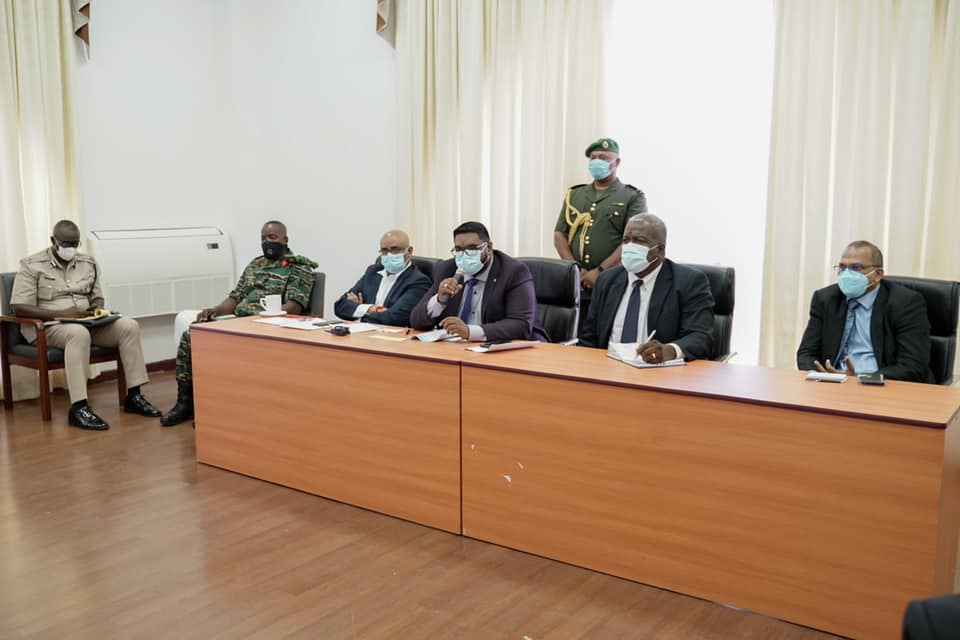 Guyana's new President Irfaan Ali (holding microphone) gets an early COVID-19 briefing following his 3 August appointment. [photo: Guyana Office of the President]
Guyana's new President Irfaan Ali (holding microphone) gets an early COVID-19 briefing following his 3 August appointment. [photo: Guyana Office of the President]
[This article was written for the Round Table website. The writer is a veteran Caribbean diplomat, currently serving as Antigua and Barbuda’s Ambassador to the United States and the Organisation of American States, He publishes widely on Caribbean political and economic issues. Opinions expressed in articles do not reflect the position of the Round Table Editorial Board.]
The one upside of the challenges facing the Government of Guyana after a 5-month impasse in declaring the result of general elections on March 2, is that the country’s economic growth in 2020 is projected at a whopping 52.8% – surpassing all 26 Latin American and Caribbean states. This trend is likely to continue for many years to come.
Guyana has become a hotbed for new oil and gas production. Since 2015, there have been 19 oil discoveries, resulting in estimated recoverable petroleum resources of more than 8 billion barrels. Between December 2019 and June 2020, this newly found wealth in oil and gas provided the government US$95m in royalties paid by ExxonMobil from its first two oil sales.
Money could go a very long way to alleviate the circumstances of the Guyanese people who, since the 1970s, have been the second poorest in the Caribbean; Haitians being the poorest. Per capita income in 2018 was US$4,760, less than half the average for the Latin American and Caribbean region. A 2014 World Bank survey identified “not enough money” as the most significant factor limiting financial inclusion in Guyana. It also said that low per capita income is only part of the problem; skewed income distribution toward the wealthiest is also significant.
Income levels should now increase, improving living standards for all, particularly the poor. But that depends on how well the oil revenues are managed and how equitably they are distributed in Guyana’s society where race has been a more defining characteristic than class. This will be the first challenge that Guyana’s new President, Irfaan Ali, and his government will face.
The government will also have to respond appropriately to demands by civil society groups – which are not always well-informed – for a better deal with the giant oil companies now engaged in exploration and production. This will include better public information on the existing contracts and on any new arrangements that might be made. Early action on this matter could douse the flames of criticism that have been fanned, particularly over the past two years.
Managing the effects of the COVID-19 pandemic is also a major and urgent challenge. At the time of writing, Guyana has confirmed 497 cases of which 186 persons have recovered and 22 have died. However, the picture is not clear. The five-month impasse over declaring the result of the March 2 Guyana elections, coincided with the spread of the coronavirus. With no legitimate government in place, controlling the disease was less than adequate and a huge spike was recorded in July. The new Government will have to get an early handle on the situation to prevent a backlash from a populace that has tolerated it only because of their greater anxiety over the threats to their peace and security posed by the five-month uncertainty over the elections result.
The biggest challenge of all, however, will be the establishment of conditions that address the fundamental issue in Guyana of racial equity. Guyana’s population of approximately 750,000 people consists of East Indian descendants (39.8%), African descendants (29.3%), mixed race (19.9%), Indigenous Amerindians (10.5%) and other races (0.5%). The majority of the population of African descent who supported the previous government, formed by A Partnership for National Unity (APNU) and the Alliance For Change (AFC), will view President Ali’s government of the Peoples Progressive Party/Civic (PPP/C) as a party of people of East Indian descent. Unless these racial fears and suspicions, which have abounded since 1957, are allayed by positive action, Guyana will exist in a state of persistent unease, deferring its opportunity to exploit its economic opportunities for the good of the nation as a whole.
Conditions in Guyana, including governance, will always be unstable, until ethnic inclusion in decision-making and economic benefits are institutionalised. Past governments, dominated by one or other of the two major racial groups, have failed to deal effectively with this issue. The new Government of Irfaan Ali has the real opportunity to tackle it seriously. To do so will call for constitutional change and institution building, and it must start with the policies of the new government. Integral to these policies should be ethnic balance in the composition of the decision-making positions throughout government ministries, statutory bodies and the security forces. Decisions should not be regarded as residing in the hands of any one ethnic group at the expense of others. Ways should be sought to institutionalise ethnic balance, including by enshrining it in the country’s constitution.
In his brief remarks on August 3, when he was sworn-in as President, Ali told the Guyanese people, “We’re building a country for every Guyanese. There is no need for fear, there is no need for distinction based on political persuasion; no need for distinction based on religious belief or ethnicity. This is a Government for all of Guyana and that is the way this Government will operate”. Making a reality of this pledge will be the new Guyana government’s biggest task, but one which will bring even bigger benefits to Guyana if it is accomplished.
Sir Ronald Sanders is also a member of the Round Table’s International Advisory Board.
Related articles:
President Ali swears in 19 other cabinet ministers – Demerara Waves, Guyana



